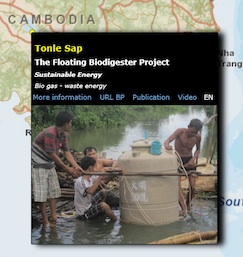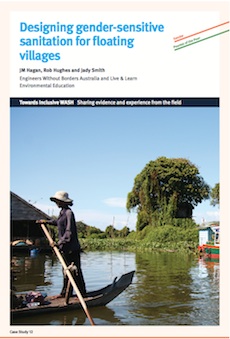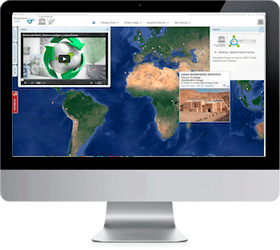Floating Bio-digesters for Waste Management and Energy Recovery in Tonle Sap biosphere reserve.
 The Tonle Sap is the largest freshwater lake in South-east Asia. It is connected to the Mekong River by the Tonle Sap River. The ecological importance of Tonle Sap was recognised in 1997 when UNESCO registered the area on the list of Biosphere Reserves.
The Tonle Sap is the largest freshwater lake in South-east Asia. It is connected to the Mekong River by the Tonle Sap River. The ecological importance of Tonle Sap was recognised in 1997 when UNESCO registered the area on the list of Biosphere Reserves.
Unfortunately, the area’s ecosystem is under serious threat due to factors such as deforestation as forests are at an accelerating rate being used for fuel wood, and a lack of sanitation as faeces and waste are directly disposed of into the lake. Currently, there is limited access to affordable and sustainable energy sources for the floating communities of the Tonle Sap and there are no affordable sanitation options available.
Live & Learn Environmental Education, Engineers without Borders Australia and Lund University Department of Water Resource Engineering are implementing a project in the Tonle Sap region that aims to reduce these problems. The Project will develop and demonstrate appropriate climate-friendly energy solutions for floating communities. Particular focus will be on achieving sanitation benefits through biodigesters that treat human waste and other community wastes.
An increase in floating pig farms in the floating communities created another waste source for these communities, but also created a potential resource as this waste could be used as a feed source into a bio-digester. The development of appropriate floating bio-digesters promises improved sanitation, energy, agricultural, and environmental outcomes.
More information | Live & Learn
Article PDF | The Energy and Environment Partnership (EEP)
 Designing gender-sensitive sanitation for floating villages | JM Hagan, Rob Hughes and Jady Smith | Engineers Without Borders Australia and Live & Learn Environmental Education | PDF
Designing gender-sensitive sanitation for floating villages | JM Hagan, Rob Hughes and Jady Smith | Engineers Without Borders Australia and Live & Learn Environmental Education | PDF















